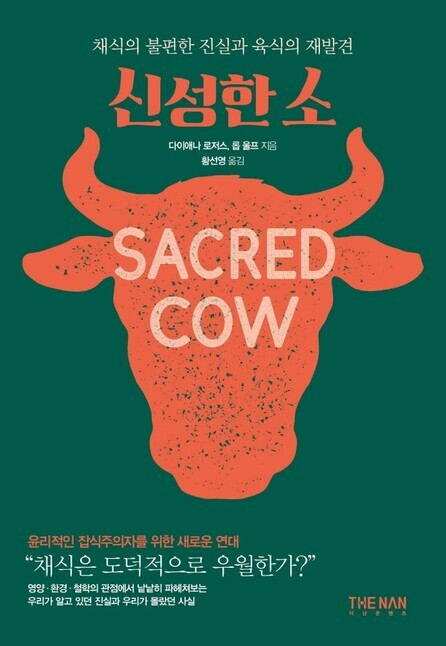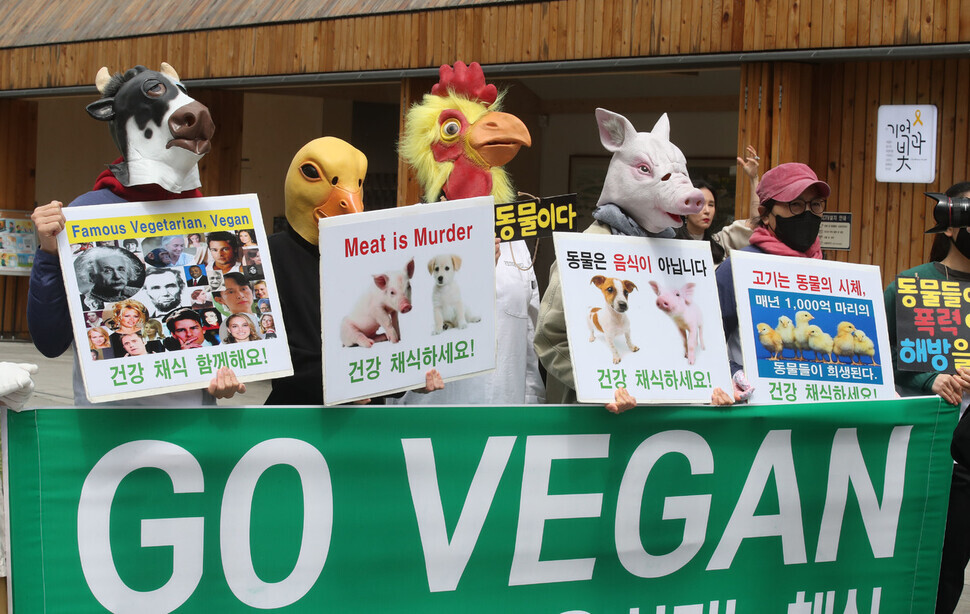hankyoreh
Links to other country sites 다른 나라 사이트 링크
[Book Review] “Sacred Cow” makes case for meat-eaters, debunk vegetarian myths

“An idea or institution unreasonably held to be immune from questioning or criticism.”
This is the Oxford English Dictionary definition of “sacred cow,” an expression that comes from the Hindu practice of regarding cows as sacred.
There are many things that come to mind when we think of “sacred cows,” but certainly some people will associate the term with vegetarianism, which has been growing as a movement for some time.
Certainly, the arguments of vegetarians are worth listening to when we consider issues such as animal rights and the ways in which factory livestock farming has accelerated greenhouse gas emissions. But it leaves many meat-eaters feeling sour when they encounter fundamentalists who equate a meat diet with pouring gasoline on a burning Earth, or with cold-blooded animal cruelty.

Taking the view that vegetarianism has become a “sacred cow” in contemporary society, this book questions whether the consumption of meat – red meat in particular – really poses serious issues in terms of nutrition, the environment, and ethics.
As recently as a half-century ago, beef was beloved as one of the most crucial protein sources for human beings. These days, however, it has not only been implicated in hypertension and various other ailments plaguing contemporary people, but also accused of a large share of responsibility for the climate crisis.
The authors of “Sacred Cow” contend that these accusations are unfair. Specifically, they insist that when the food industry has become intensely politicized, eliminating the existing meat industry and fostering a “cultured meat” industry to replace it is not a viable alternative for the world.
The authors focus on the various flaws in the recent findings cited by vegetarians. For instance, they argue that studies showing improvements in health from a vegetarian diet typically overlook or willfully ignore the tendency for people adopting such a diet to also cut down on their consumption of instant foods, which contain lots of chemical additives.
Many of the studies and data cited in the book are rather controversial. The things claimed by vegetarians and the points argued in the book are mirror images of one another, and non-expert readers may find it difficult to decide which side they agree with.
But there are also a lot of things worth noting. One of those is that as people tend to view meat-eating and vegetarianism along “either-or” lines, nothing is actually being done about the food systems that are so toxic to the Earth’s future.
For instance, large-scale corporate monoculture farming of corn, wheat, soybeans, and other grains has been devastating to the Earth’s surface soil. Almonds, a type of nut enjoyed by many vegetarians, are mass-produced in California, a dry climate where huge amounts of water have to be artificially introduced to water the trees.
It’s a state of affairs that has exacerbated the water shortage the world is already facing. Meanwhile, the herbicides and pesticides that get doused on corn end up infiltrating our underground water.
The authors further share their concerns that the “cultured meat” industry — which has been emerging as an alternative to the traditional livestock industry — is very likely to end up simply fattening a small minority of businesspeople due to the patent competition for all of the technology involved.
Their conclusion is that rather than focusing too much on new technologies like these, we should be reducing the use of factory livestock farming and corporate monoculture farming, working instead to encourage regenerative farming, where small-scale farm owners are able to allow their livestock to graze.
The idea is that by eliminating the cornfields used to produce feed and allowing cattle to graze there instead, we can recover our depleted soil while boosting local economies.
In some ways, the book’s arguments echo those of vegetarians themselves, with their calls to develop small-scale locally based agriculture, revitalize local markets, and take part directly — even at just a small scale — in food production.
While they may differ on “what” we should eat, there is some potential for vegetarians and meat-eaters to coexist peacefully in the debate over “how” we should eat.
By Kim Eun-hyoung, staff reporter
Please direct comments or questions to [english@hani.co.kr]

Editorial・opinion
![[Editorial] Intensifying US-China rivalry means Seoul must address uncertainty with Beijing sooner than later [Editorial] Intensifying US-China rivalry means Seoul must address uncertainty with Beijing sooner than later](https://flexible.img.hani.co.kr/flexible/normal/500/300/imgdb/original/2024/0517/8117159322045222.jpg) [Editorial] Intensifying US-China rivalry means Seoul must address uncertainty with Beijing sooner than later
[Editorial] Intensifying US-China rivalry means Seoul must address uncertainty with Beijing sooner than later![[Column] When ‘fairness’ means hate and violence [Column] When ‘fairness’ means hate and violence](https://flexible.img.hani.co.kr/flexible/normal/500/300/imgdb/original/2024/0516/7417158465908824.jpg) [Column] When ‘fairness’ means hate and violence
[Column] When ‘fairness’ means hate and violence- [Editorial] Yoon must stop abusing authority to shield himself from investigation
- [Column] US troop withdrawal from Korea could be the Acheson Line all over
- [Column] How to win back readers who’ve turned to YouTube for news
- [Column] Welcome to the president’s pity party
- [Editorial] Korea must respond firmly to Japan’s attempt to usurp Line
- [Editorial] Transfers of prosecutors investigating Korea’s first lady send chilling message
- [Column] Will Seoul’s ties with Moscow really recover on their own?
- [Column] Samsung’s ‘lost decade’ and Lee Jae-yong’s mismatched chopsticks
Most viewed articles
- 1For new generation of Chinese artists, discontent is disobedience
- 2[Editorial] Transfers of prosecutors investigating Korea’s first lady send chilling message
- 3S. Korea “monitoring developments” after report of secret Chinese police station in Seoul
- 4Xi, Putin ‘oppose acts of military intimidation’ against N. Korea by US in joint statement
- 5[Exclusive] Unearthed memo suggests Gwangju Uprising missing may have been cremated
- 6N. Korean media upgrades epithet for leader’s daughter from “beloved” to “respected”
- 7Yoon says concern about biased diplomacy is being incited by “communist totalitarian forces”
- 8[Column] US troop withdrawal from Korea could be the Acheson Line all over
- 9[Editorial] Intensifying US-China rivalry means Seoul must address uncertainty with Beijing sooner t
- 10[Interview] Recalling seeing soldiers secretly burying bodies behind Gwangju Prison